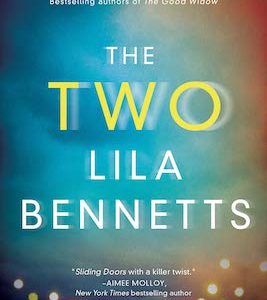There’s something truly terrifying, and instantly relatable, when a child gets caught in the web of a really great horror story. After all, we were all children once. Wide-eyed in our beds with the covers pulled up, afraid of the monsters in our closets, the sharp talons of a demon under the bed, the boogeyman at our window. When writing Theme Music, I had to tap into that long ago fear, that unreasonable certainty that a fiend is lurking in the shadows just beyond my awareness, and found it remarkably easy to do. Whether terror is all in our minds, or in the walls themselves, horror can take many shapes, especially on the pages of a good book. Here are a few stories that awoke my inner child and scared the hell out of her.
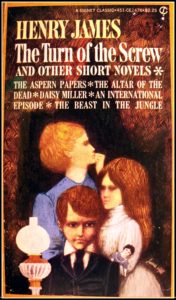
Henry James, The Turn of the Screw
The exact nature of evil in Henry James’s The Turn of the Screw is open for interpretation, but one thing can be agreed upon: horror rests solely with the children. But are we afraid for the children, or are we afraid of the children? It’s this dilemma the narrator must confront when she accepts a governess position to care for Flora and Miles after the death of their parents. When apparitions begin to appear in the dark windows of Bly, the unnamed governess suspects that the children may be consorting with their former governess, Miss Jessel, and the disreputable valet, Mr. Quint, both of whom died under unusual circumstances. But when the governess presses the children for the truth, their reassuring smiles take on a sinister light, deteriorating her sanity and raising the level of terror with each turn of the screw.

Sarah Waters, The Little Stranger
The Little Stranger by Sarah Waters draws you into post war England and traps you inside a horrifying, yet irresistible, haunted mansion. Enamored after visiting Hundreds Hall with his mother as a young boy, Dr. Faraday is summoned to the Ayres’s home to attend to the needs of a young chambermaid who has fallen ill. Once inside, he begins to understand that more may be wrong with the gothic manor than its dilapidated appearance. Hundreds Hall leaves a mark, especially on the children who grew up under its crumpling roof. Like scorched auguries on the walls, the stain of the malevolence rises to the surface of the skin, a filthiness that cannot be scrubbed clean. But is The Little Stranger just a germ, an “inherited family madness?” Or is it a “sly, spiteful child,” a jealous spirt who bites when threatened, setting fires and playing mean tricks to get attention? And when dismissed by Dr. Faraday as nothing more than a nervous condition of those who have experienced her ethereal presence, will she whisper thoughts of suicide to lure her family to her dark realm? I climbed the terrifying staircase of this novel knowing full well I might be shoved over the railing when I reached the top, and indeed I was.
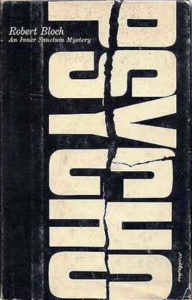
Robert Bloch, Psycho
Psycho by Robert Bloch: A house doesn’t have to be haunted to be possessed by the dead. Nor do you have to be a child to succumb to the evil presence of a dominating mother. Just ask Norman Bates, a middle aged bachelor who runs a motel off a deserted highway. Proficient in taxidermy, Norman has exhumed, preserved, and tucked his mother in for the night when a fatigued traveler makes the unfortunate mistake of checking in. Suffering from split personalities, Norman can no longer control “Mother,” and when she catches him spying on their lovely guest, she puts on her best dress, grabs a butcher knife, and creeps into her room. You only have to throw back the shower curtain to reveal what insanity lies behind this monstrous tale, but in order to do that, you have to check into the Bates Motel. Though most of us know the movie well enough to no longer be shocked by its twisted revelation, I have to admit, after reading this again, I was traumatized anew, and dreading my next shower.
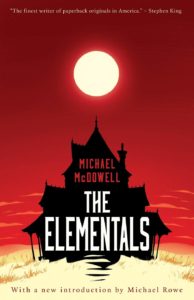
Michael McDowell, The Elementals
The Elementals by Michael McDowell lures a cynical thirteen year-old girl, India, and her eccentric, extended family to the Alabama coast for a little R&R after the death of her grandmother, Marian Savage. Three identical Victorian mansions loom in the hot sands of Beldame like the ruins of a lost armada. Draped in the rotting fringe from another time, only two of the houses remain habitable. The “third house” has been overtaken by a huge and ominous dune—doom if you dare climb up it to get a peek through a grimy, uncurtained window. As a godless summer heat descends on Beldame and Beldame alone, India becomes fascinated by haunting stories of the third house, and ignores warnings not to go inside. Like standing in an hourglass, sand climbs up the walls and over your imagination. But it is what squirms beneath is the sand in the third house that will grab you by throat and pull you under in this truly unsettling tale.
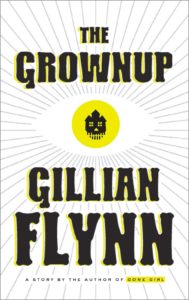
Gillian Flynn, The Grownup
The Grownup by Gillian Flynn is a delightfully unsettling novella about a con woman who visits a haunted home under the pretense of performing a “cleansing.” Though she is not a believer, she can make anyone believe that she’s the world’s most leading authority on the supernatural. On her first visit to Carterhook, she learns that something really is off with the house, and also with the step son of the woman who hired her. As the quintessential creepy kid—part Bad Seed, part Damien from The Omen—Miles seems to be the evil root growing in the Burke’s garden, spreading fear and choking off their happiness. But is he the malevolent force wreaking havoc on their peaceful suburban lives, switching lights on and off, causing blood to trickle from the walls, and cutting off the housecat’s tail? Or is someone else laying a trap? In this fabulously twisted tale of cat and mouse it’s hard to tell feline from vermin. Even after all is revealed, you may still not know which is which.
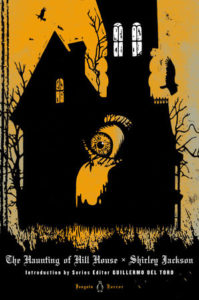
Shirley Jackson, The Haunting of Hill House
The Haunting of Hill House by Shirley Jackson is such an expertly crafted tale of horror that you don’t realize that you’re being scared to death until it’s too late to throw the book across the room. After the death of her mother, an invitation to take part in the paranormal investigation of an eighty year-old haunted mansion seems like a dream come true for Eleanor Vance. Chosen for a telekinetic event she experienced as a child, she, along with Dr. Montague and two others, are to spend a summer at Hill House. But after a week bizarre and terrifying events, the others begin to suspect that the house has adopted Eleanor into its chaotic and demented design. It’s hard to determine if the vile house has gotten under Eleanor’s skin, or if she has painted her despair upon its walls, but as she slowly begins to descend into madness, we can clearly hear the lunacy of Hill House corrupted in her thoughts. Forced to leave after making a treacherous climb up an iron staircase where a suicide had once occurred, Eleanor cannot bring herself to say farewell to the only place she has ever felt welcome. Rather than driving home, as the others hope she’ll do, they watch in horror as her car gains speed toward a tree, and Eleanor becomes a part of Hill House evermore.
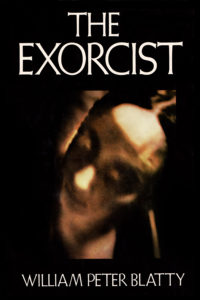
William Peter Blatty, The Exorcist
The Exorcist by William Peter Blatty gets under your skin in a way no other horror novel can, or ever will. Reflecting on it now, all these years later, I have to wonder if the slight itch on my chest is just that, or a demonic word is rising to the surface. As horrible as that would be, for twelve year-old Regan McNeil, it was but a prelude of the horrors to come. Though an atheist, when modern medicine can’t explain her daughter’s strange and sudden illness, Chris McNeil turns to Father Karras for spiritual help. In the midst of a crisis of faith after the death of his mother, Father Karras agrees to see Regan solely on a psychiatric basis. But when Regan exhibits signs of demonic possession, Father Karras seeks permission to perform an exorcism. When the priest who was sent to help him suddenly dies from cardiac arrest, Father Karras must sacrifice his own life to save the soul of a child.
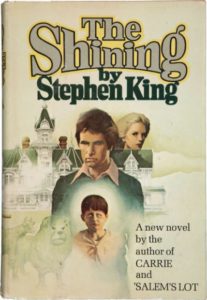
Stephen King, The Shining
The Shining by Stephen King. That’s all I really need to say. Every fan of horror knows the rest. It’s simply the best psychological horror/thriller novel of all time. But for the few who have not read it, or are just beginning a love affair with the horror genre, The Shining will isolate you at the Overlook Hotel in the dead of winter with eight year-old Danny Torrance, his timorous mother, Wendy, and his alcoholic father, Jack. In hopes of curing a bout of writer’s block, Jack Torrance accepts the position of caretaker of the Overlook for the off-season. As he and his family settle in, Danny begins to have visions of the hotels bloody past. Frightened by her son’s odd behavior, Wendy turns to her husband for help. But he too has taken on a strange demeanor, one indicative of past violent tempers. When a winter storm cuts them off from the outside world, Jack becomes unhinged, sabotaging their only form of transportation, a snowmobile, and smashing the CB radio. After Jack attends a ghostly party in the hotel bar and chases Wendy through the hotel with a mallet, Danny psychically reaches out to the hotel manager, Dick Hallorann, for help. Rushing to their aid as the hotel boiler is about to explode, Halloran ushers Wendy and Danny to safety, but it is too late for Jack, and for the Overlook Hotel.
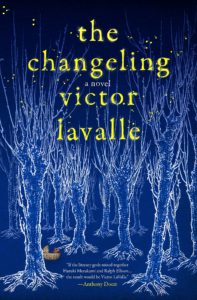
Victor Lavalle, The Changeling
Be careful what you wish for when reading The Changeling by Victor Lavalle, especially if it’s “a life full of adventure.” And what an adventure this story was! When Apollo Kagwa’s father abandons him as a young boy, a disturbing storybook and a lifetime of nightmares are all that Apollo has to remember him by. Now as an adult, and a rare book dealer, Apollo and his wife, Emma, a librarian, have a baby of their own to raise. Knowing firsthand the heartache of a broken home, Apollo swears to be a better father to his son than his father was to him. But when his wife’s sudden and strange behavior threatens to destroy their happy home, Apollo begins to worry that a stable family unit may not be possible. After receiving cryptic text pictures of her baby boy in situations that are as implausible as they are dreadful, Emma starts to deteriorate both physically and mentally. Troubles at home reach a perilous pitch when Apollo awakes chained to a radiator, a red hot kettle screaming on the stove top. Emma states “it’s not a baby” just before entering the nursery with the kettle of boiling water balanced on her bare palm. After being released from prison for holding his wife’s coworkers at gun point to obtain information on her whereabouts, Apollo embarks on a dangerous crusade to find the truth of what happened to his son. But as the truth leads him down a dark path in a forest just outside of New York City, the meaning behind the ghastly fairytale his father read to him as a child becomes frighteningly clear: “Monsters aren’t real until you meet one.”
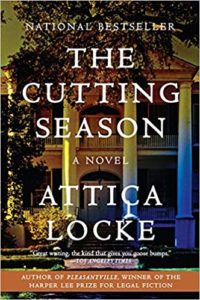
Attica Locke, The Cutting Season
The Cutting Season by Attica Locke finds a single mother, Caren Gray, as the general manager of an antebellum plantation that has been turned into a tourist attraction for destination weddings and historical re-enactments. Having been raised on the grounds by a single mother herself, Caren knows all too well the haunting stories of Belle Vie. When the body of a local migrant is found face down in a ditch at the edge of the property, Caren begins to understand that more than a haunted cabin in the eerily well-persevered slave quarters is threatening her tranquil existence. The past and the present collide as the crime scene further divides two worlds—that of the picturesque plantation and a booming sugar cane industry—neither of which are prepared to give up their rightful claim to the land. But in order to solve one murder, which would save both the plantation and an innocent man, Caren must first solve another, one that might explain the continued and ghostly presence of her great-great-great grandfather, Jason, and expose a shocking secret that has been buried beneath the “loamy topsoil” of Belle Vie for over a century.
















